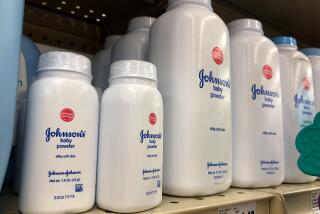L.A. jury hits Johnson & Johnson with $417-million verdict over cancer link to its talc
- Share via
A Los Angeles jury issued a $417-million verdict Monday against Johnson & Johnson, finding the company liable for failing to warn a 63-year-old woman diagnosed with terminal ovarian cancer about the risks of using its talcum products.
The verdict marks the largest award yet in a number of suits claiming that the company’s talc powder causes ovarian cancer. More than 300 lawsuits are pending in California and more than 4,500 claims in the rest of the country, alleging that the healthcare giant ignored studies linking its Johnson’s Baby Powder and Shower to Shower products to cancer.
The plaintiff, Eva Echeverria, was diagnosed with ovarian cancer in 2007. A surgeon removed a softball-sized tumor, but Echeverria is now near death and was unable to attend the trial, one of her attorneys said.
In a video-recorded deposition played for the jury, she testified she used the Johnson’s Baby Powder from age 11 until 2016, when she saw a news story about a woman with ovarian cancer who had also used the product. The talc is one of the company’s best-known products, marketed at one point with the jingle, “A sprinkle a day helps keep the odor away.”
Echeverria testified that if Johnson & Johnson, which earned a profit of $16.5 billion last year, had put a warning on the product, she would have stopped using it.
After two days of deliberating, jurors awarded Echeverria $70 million in compensatory damages and $347 million in punitive damages. The jury panel found there was a connection between her ovarian cancer and the baby powder.
“We are grateful for the jury’s verdict on this matter and that Eva Echeverria was able to have her day in court,” said Mark Robinson, one of her attorneys, who accused Johnson & Johnson of “covering up the truth for so many years.”
Johnson & Johnson immediately announced it would seek to overturn the verdict.
“We will appeal today’s verdict because we are guided by the science, which supports the safety of Johnson’s Baby Powder,” the company said in a statement.
During the trial, the company’s lawyers argued that various scientific studies as well as federal agencies, including the U.S. Food and Drug Administration, had not found that talc products are carcinogenic.
Among the studies the company cited was one in 2000 by researchers at Harvard University that was part of the National Nurses Health Study of more than 121,000 women, including 78,630 who said they had used talc. Ovarian cancer eventually struck 307 of them. The researchers concluded there was “no overall association” between talc use and “epithelial ovarian cancer,” though there was a “modest elevation in risk” for one variety of the disease. That type, invasive serous ovarian cancer, is the one Echeverria has, according to court papers.
Echeverria’s attorneys argued that women nationwide trusted that Johnson & Johnson wouldn’t market an unsafe product, only to learn too late that the company had known long ago about other research showing a relationship between its talc and cancer.
The lawsuit cited a 1982 study that shows women who used talc on their genitals were at a 92% increased risk for ovarian cancer. The lead researcher, Daniel W. Cramer, later advised Johnson & Johnson to put a warning label on the product.
Ovarian cancer accounts for 1.3% of all new cancer cases in the U.S., according to the National Cancer Institute. But it is the eighth most common cancer and the fifth-leading cause of cancer-related death among women. Fewer than half of all patients survive five years after a diagnosis.
The David-and-Goliath nature of Echeverria’s lawsuit played out against a long history of litigation over product liability involving huge industries or corporate giants. Her attorneys sought to portray Johnson & Johnson as acting like Big Tobacco by continuing to promote a product its executives knew had links to cancer.
In May, a St. Louis jury awarded a Virginia woman $110.5 million. By then, three other St. Louis juries had awarded a total of $197 million to plaintiffs who made similar claims.
To read the article in Spanish, click here
Twitter: @lacrimes
ALSO
Target is shedding Merona and Mossimo and adding new brands instead
Elon Musk and AI experts urge U.N. to ban artificial intelligence in weapons
An appeals court just handed Uber a huge victory over its passengers
UPDATES:
2:50 p.m.: This article was updated with more background about the Los Angeles lawsuits and other verdicts.
This article was originally published at 1:30 p.m.
More to Read
Sign up for Essential California
The most important California stories and recommendations in your inbox every morning.
You may occasionally receive promotional content from the Los Angeles Times.














